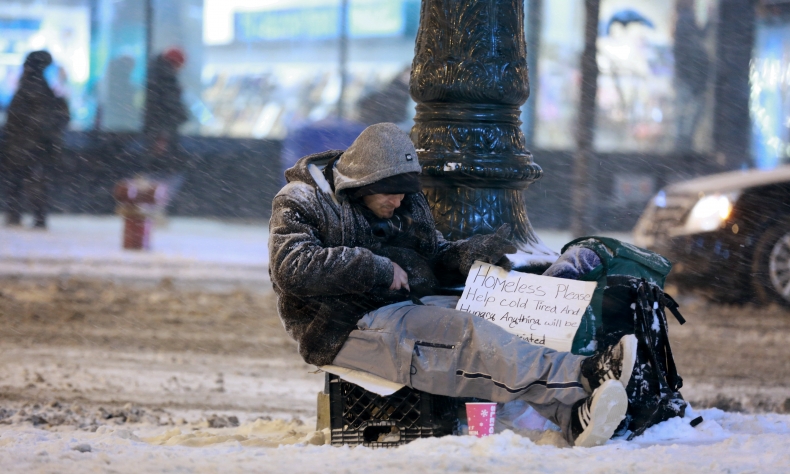The Effective Governance and Poverty Issue: A U.S.-China Case Comparison

The U.S. is a prosperous society that cares little about the wellbeing of its most vulnerable.
China made global news two years ago when it announced the success in lifting almost 800 million of its citizens out of poverty. In a review of how China completed this phenomenal feat in roughly 40 years, the World Bank (joined in this examination by critical units of the Chinese government) concluded that rapid economic growth within China had played a pivotal role. However, a second factor — of equal importance but easy for outsiders to sweep aside — was also relevant: The government committed itself and all of society to ensuring poverty alleviation would happen.
The report stated: “China’s success benefited from effective governance, which was key to the successful implementation of the growth strategy as well as the evolving set of targeted poverty reduction policies.”
The report commended the “capable and effective government” that engaged in “strong monitoring and [demanded] accountability between levels of government” in order to guarantee that the eradication of extreme poverty happened. Policies that emphasized improvements in infrastructure, education and job creation flowed from this promise. It shows that the Chinese government is aiming at growth benefiting all its people, leaving nobody in poverty.
Compare this demonstration of leadership in aiding the poor to what has taken place over the last few days in Washington, where President Joe Biden, a Democrat, struggled to find common ground with Republicans in Congress as talks about raising the debt ceiling were taking place. The deal the two sides reached still has to be approved by the entire House of Representatives; if it is, America’s poor will at best remain that way. At worst? They will slip even further behind, making them even more vulnerable to health and economic forces that attack them first and often with intense ferocity.
Consider just two elements of the bill that strike directly at America’s poor. First, it mandates that Americans under 55 who are able to work must be working a minimum of 20 hours per week or actively searching for work or training for work in order to retain their SNAP, Supplemental Nutrition Assistance Program, benefits. Right now, that stipulation is for people no older than 49. Viewed another way, significant pockets of America that struggle to keep a job — either because they lack transportation or specific skills — now head to bed at night knowing they might soon lose those few extra dollars a month that help them buy basic food necessities.

Next, provisions of the bill could lead to more than 1.5 million Americans losing their health care. Why? As the Kaiser Family Foundation, an organization that scrutinizes health care issues, reported: “certain adult enrollees ages 19-55 would need to work or participate in other qualifying activities (like community service or job training) for at least 80 hours per month” [in order to keep their Medicaid benefits]. Granted, the states could decide to pay the full amount of those costs, but we know full well that in Republican-led states such an idea would be dead on arrival. In Democratic-led states, there is also little appetite for funneling tax dollars to the poor.
According to one estimate, 21 million Americans might fall victim to the work requirements and another 600,000 are likely to become uninsured.
Keep in mind that women who are pregnant or postpartum would not be exempt from these requirements. Perhaps we should not be shocked. The United States right now is one of only a handful of countries around the world that does not offer paid maternity leave, so no one should be too surprised that poor pregnant women would be treated as carelessly as they are in this debt-ceiling bill. In case you were wondering, yes, China does compensate women who are on maternity leave.
Republicans seem quite happy punishing America’s poor populations, no matter if they are men or women, and no matter their skin color. Remember, this is the party that claims loudly and consistently that it fully supports human rights and the right to life. The bitter truth is that Republicans lose all semblance of morality when they look at the poor. The stipulations they set out in the debt-ceiling negotiations further affirm the GOP is always eager to help the rich and also willing to stick it to the poor.
Earlier, I mentioned that there was no guarantee that the current bill will generate enough votes to pass. That is because a contingent of Republicans want no compromise; they would rather see the U.S. go into default — forget the domestic and global chaos that might follow — rather than talk to Democrats. These Republicans must be considered the harshest, the most uncaring, the cruelest when it comes to lending a helping hand to America’s poorest people.
Meanwhile, China, and most especially President Xi Jinping, has acknowledged that China should be considered a “moderately prosperous society” that must continue its commitment to raising the economic prosperity for the most vulnerable. By contrast, the U.S. is a prosperous society that cares little about the wellbeing of its most vulnerable.
Tell me how such an attitude squares with America’s “exceptionalism?”
The article reflects the author’s opinions, and not necessarily the views of China Focus.
 Facebook
Facebook
 Twitter
Twitter
 Linkedin
Linkedin
 Google +
Google +







